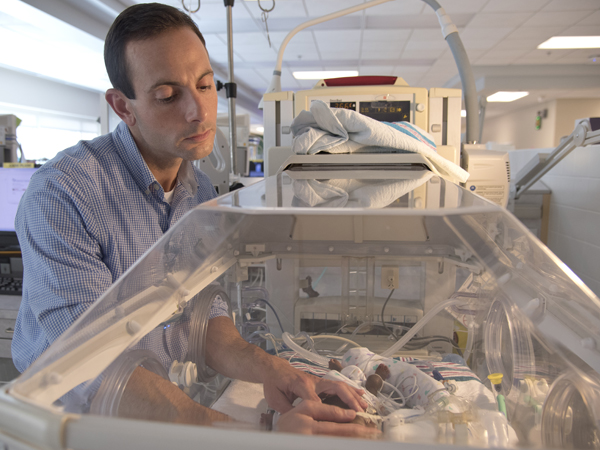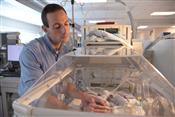New FASD diagnosis guidelines key to early intervention

Published in News Stories on September 19, 2016
It's the leading cause of preventable mental retardation, as easy to stop as saying no to a cocktail, beer or glass of wine.
Fetal Alcohol Spectrum Disorders, said Dr. Omar Abdul-Rahman, professor of pediatrics at UMMC, are often undiagnosed or misdiagnosed.
Abdul-Rahman was part of the working group that developed new National Institutes of Health guidelines for diagnosing Fetal Alcohol Spectrum Disorders, or FASD. The research includes a new definition of prenatal alcohol exposure and guides to evaluating deformities and impairments.
“These new guidelines will be a valuable resource for clinicians to accurately diagnose infants and children who were affected by alcohol exposure before birth,” said National Institute on Alcohol Abuse and Alcoholism Director George F. Koob in an NIH news release. “They represent the most data-driven diagnostic criteria for fetal alcohol syndrome and fetal alcohol spectrum disorder produced to date.”
Dr. H. Eugene Hoyme, the main author of the research, published in the journal Pediatrics, was Abdul-Rahman's mentor, and he was mentored by Dr. Ken Jones, considered to be the father of FASD research. So when Abdul-Rahman was offered the chance to join the research, he jumped at the opportunity.
“When the mentor of your mentor is the person who discovered FASD, you want to be a part of the research,” he said.
What the team found was “fascinating,” said Abdul-Rahman. “Evidence of FASD has been seen across the world.”

Famuyide
In Mississippi, more than 450 babies are born each year with FASD, which can cause vision and hearing problems, heart and respiratory problems, facial deformities, low birth weight, learning disabilities and behavioral issues such as poor impulse control.
“I perceive FASD as a big problem because of the wide spectrum of presentation, particularly in the preterm infant,” said Dr. Mobolaji Famuyide, associate professor in neonatology at UMMC. “The devastating effects are not always clearly evident in the newborn period and may be missed if maternal history is not explored.”
Said Dr. Renate Savich, professor of pediatrics and chief of the Division of Newborn Medicine at UMMC: “We know that the full blown Fetal Alcohol Syndrome is just the tip of the iceberg, and we are recognizing that other babies affected by maternal drinking will have other significant impairments. FASD is the largest preventable cause of neurodevelopmental abnormalities in babies, infants and children, and there is no treatment available to fix this once it occurs.”

Savich
According to the Mississippi Council on FASD, at least 55 percent of women are drinking at the time they become pregnant, and some continue to drink heavily throughout their pregnancies.
To risk FASD, alcohol use doesn't have to be in the binge-drinking range, Abdul-Rahman said. “There is no known safe level of alcohol use during pregnancy.”
Even among children whose mothers had consumed one drink or less per week had increased rates of Attention Deficit Disorder in first grade, he said, citing the recent research.
Some forms of FASD, such as alcohol-related neurodevelopmental disorder (ARND), are “tricky to diagnose,” Abdul-Rahman said, because the signs are not present until later, when children are in school and not functioning at a higher cognitive level or showing very impulsive behavior.”
Since alcohol has proven to be toxic to the frontal lobe of an embryo's brain, children with FASD can be likely to make poor decisions later in life and can be easily coerced by peer pressure, he said.
Knowing a child has FASD can be helpful in developing educational strategies. “Children with FASD tend to use more of their senses when learning - hearing and touching, and not just seeing.”
Said Hoyme: “We're hopeful that the improved specificity of these guidelines will help clinicians to assess FASD better, thereby leading to early intervention for affected children.”
Photos
 | High Resolution Medium Resolution Low Resolution |
 | High Resolution Medium Resolution Low Resolution |


